
Like many other countries, Japan is blessed with beautiful nature and all kinds of animals.
When you start learning the Japanese language, picking up the most common Japanese animal names will be an inevitable part of the process! Animals play a central role in our lives, so learning what to call them is important. Doing so will not only allow you to talk about your pets or favorite animals with native speakers, but also help you understand Japanese idioms and stories related to them.
The good news is that learning Japanese animal names is actually very easy! Do you know why? It’s because animal names in Japanese are often short and simple, and we also use plenty of loanwords from other languages (usually English) to label foreign animals.
While the Kanji for many Japanese animal names is difficult, don’t let this worry you. Even ordinary Japanese people don’t know how to write or read them, so the much simpler Hiragana and Katakana are more commonly used.
In this article from JapanesePod101.com, you’ll learn popular animal names in Japanese, from pets and farm animals to sea animals and insects. We’ll also introduce animal sounds in Japanese and animal-related Japanese proverbs.
Ready to boost your vocabulary and cultural knowledge? Let’s go!
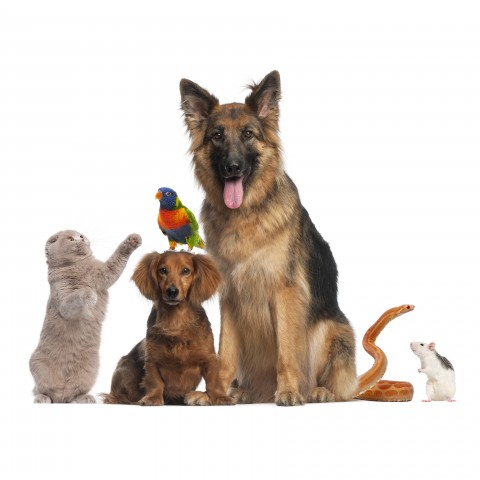
 Table of Contents
Table of Contents
- Pets
- Farm Animals
- Wild Animals
- Sea Animals
- Bugs and Insects
- Birds
- Reptiles
- Animal Body Parts
- Animal Sounds
- Animal-Related Proverbs
- Conclusion
1. Pets
The Japanese word for “animal” is 動物 (dōbutsu). Literally, this breaks down to 動 (“moving”) + 物 (“thing”).
Japanese does not distinguish between singular and plural nouns, so the word 動物 (dōbutsu) and all of the animals listed in this article can refer to one animal or many.
To talk about baby animals in Japanese, we add the word for “child” to the beginning of the animal name in question: 子 こ (ko).
- うさぎ (usagi) – “rabbit” → 子うさぎ (kousagi) – “baby bunny”
The most common Japanese counter word for animals is 匹 ひき (hiki), which we place after the number. Or, if we’re counting larger animals, we can use the word 頭 とう (tō), meaning “head.”
For example:
- 私は犬を2匹飼っています。
Watashi wa inu o ni-hiki katte imasu.
“I have two dogs.”
To learn more about numbers in Japanese, please check out our article Japanese Numbers: Let’s Master the Basic Japanese Numbers!
Following is a list of popular pet animals in Japan.
| English | Kanji | Hiragana / Katakana | Reading |
| “dog” | 犬 | いぬ | inu |
| “puppy” | 子犬 | こいぬ | koinu |
| “cat” | 猫 | ねこ | neko |
| “kitten” | 子猫 | こねこ | koneko |
| “rabbit” | 兎 | うさぎ | usagi |
| “hamster” | ー | ハムスター | hamusutā |
| “mouse” / “rat” | 鼠 | ねずみ | nezumi |
| “budgerigar” | ー | インコ | inko |
| “parrot” | ー | オウム | ōmu |
| “goldfish” | 金魚 | きんぎょ | kingyo |
| “hedgehog” | ー | ハリネズミ | harinezumi * literally “needle mouse” in Japanese. |
* The Kanji for “rabbit” (兎) and “mouse” (鼠) are difficult and uncommon. We normally use Hiragana or Katakana for these words.
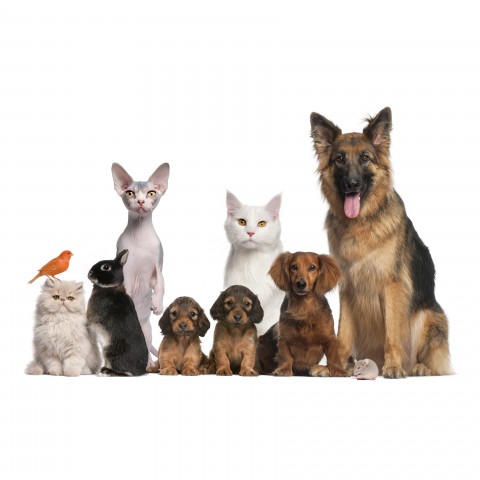
Like many other countries, dogs and cats are popular pets in Japan.
2. Farm Animals
Popular farm animals in Japan include cows, pigs, sheep, chickens, and horses. Ducks and swans are commonly seen in the countryside.
In addition to the counter words 匹 ひき (hiki) and 頭 とう(tō), meaning “head,” there’s also a counter used for birds: 羽 わ (wa), meaning “feather.”
For example:
- この農場には馬が4頭います。
Kono nōjō ni wa uma ga yon-tō imasu.
“There are four horses on this farm.”
- この湖には白鳥が10羽います。
Kono mizūmi ni wa hakuchō ga jū-wa imasu.
“There are ten swans in this lake.”
Here’s a list of animals in Japanese you’re likely to find on a farm or in the countryside:
| English | Kanji | Hiragana / Katakana | Reading |
| “cow” | 牛 | うし | ushi |
| “calf” | 子牛 | こうし | koushi |
| “pig” | 豚 | ぶた | buta |
| “piglet” | 子豚 | こぶた | kobuta |
| “horse” | 馬 | うま | uma |
| “foal” | 子馬 | こうま | kouma |
“sheep” | 羊 | ひつじ | hitsuji |
| “baby sheep” | 子羊 | こひつじ | kohitsuji |
| “goat” | 山羊 | やぎ | yagi |
| “donkey” | ー | ロバ | roba |
| “chicken” | 鶏 | にわとり | niwatori*literally “garden bird” in Japanese. |
| “chick” | ー | ひよこ | hiyoko |
| “duck” | 鴨 | かも | kamo |
“goose” | ー | ガチョウ | gachō |
| “swan” | 白鳥 | はくちょう | hakuchō* literally: “white bird” in Japanese |
You can also hear the pronunciation of these words on our Animal Names vocabulary list.
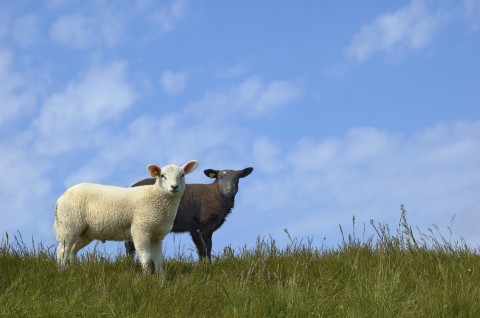
Sheep farms are famous in Hokkaido.
3. Wild Animals
Now that we’ve looked at a few domesticated creatures, it’s time to learn the names of different wild animals in Japanese. Below, you’ll also find some interesting facts about indigenous animals in Japan and how mythology influenced our naming of the giraffe!
A- In the Forest
Did you know that Japan is actually a country of forests, despite the image foreigners often have of a sushi-eating island country surrounded by the sea? Around 73% of the land in Japan is mountainous, 66% of which is forested.
This means there are a lot of forest animals! Some of you might have seen pictures of Japanese monkeys enjoying natural hot springs (温泉 Onsen) in the snowy weather, for example.
Forest animals often appear in Japanese folktales, idioms, and proverbs. Monkeys are considered clever and are thought to be the closest animal to humans. Raccoon dogs and foxes are often seen as animals that have mysterious powers and the ability to play tricks on humans.
Since many of the following forest animals are indigenous to Japan, they have original names in Japanese (including their own Kanji).
| English | Kanji | Hiragana / Katakana | Reading |
| “deer” | 鹿 | しか | shika |
| “bear” | 熊 | くま | kuma |
| “monkey” | 猿 | さる | saru |
| “wild boar” | 猪 | いのしし | inoshishi |
| “raccoon dog” | 狸 | たぬき | tanuki |
| “fox” | 狐 | きつね | kitsune |
| “squirrel” | 栗鼠 * | りす | risu |
| “wolf” | 狼 | おおかみ | ōkami |
* The Kanji for “squirrel” (栗鼠) is difficult and uncommon. We normally use Hiragana or Katakana instead.
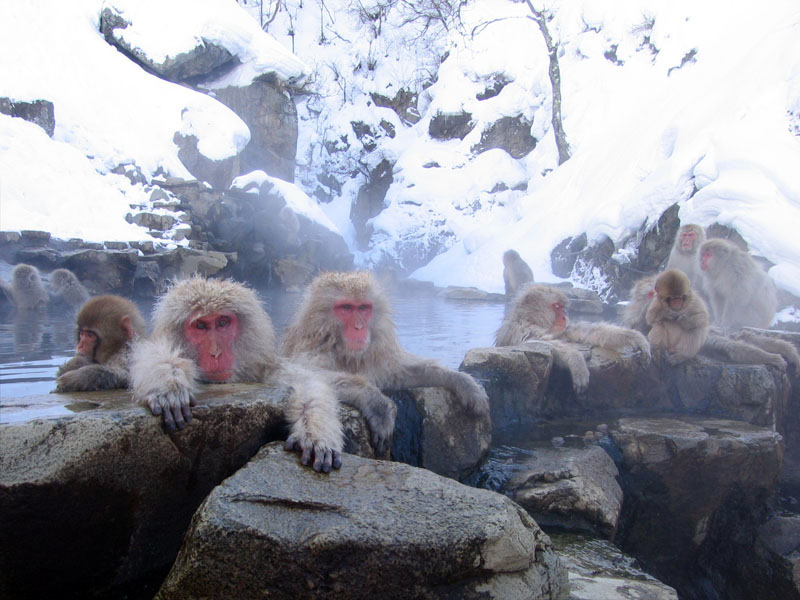
Japanese monkeys love Onsen hot springs.
B- Safari Animals (and Others)
There is no Kanji for animals that originate from places that are very far away from Japan, such as safari animals or those from Oceania. They’re typically expressed in Katakana as loanwords or named in Japanese after their characteristics.
Some animals—such as elephants, tigers, and leopards—have Kanji because they’re indigenous to Asian countries (China, India, etc.), and they became known to Japan through trading. Such Kanji were directly imported from the Chinese language, but the names (phonetic readings) are original to Japanese.
| English | Kanji | Hiragana / Katakana | Reading |
| “elephant” | 象 | ゾウ | zō |
| “giraffe” | ー | キリン | kirin |
| “lion” | ー | ライオン | raion |
| “tiger” | 虎 | トラ | tora |
| “panda bear” | ー | パンダ | panda |
| “zebra” | ー | シマウマ | shimauma*literally “striped horse” in Japanese. |
| “hippopotamus” | ー | カバ | kaba |
| “rhinoceros” | ー | サイ | sai |
| “ostrich” | ー | ダチョウ | dachō*It means “camel bird” in Japanese. |
| “baboon” | ー | ヒヒ | hihi |
| “hyena” | ー | ハイエナ | haiena |
| “cheetah” | ー | チーター | chītā |
| “leopard” | 豹 | ヒョウ | hyō |
| “koala bear” | ー | コアラ | koara |
| “kangaroo” | ー | カンガルー | kangarū |
| “camel” | ー | ラクダ | rakuda |

The キリン (kirin), or “giraffe,” was named after the Chinese dragon-like mythical animal called 麒麟 (qílín).
4. Sea Animals
A recent study revealed that there are about 34,000 species of sea animals living in the oceans near Japan, including everything from plankton to mammals. This means that about 13.5% of all confirmed marine life abound in less than 1% of the world’s ocean.
As a country blessed with lots of ocean, Japan has an abundance of words related to fish, called 魚 さかな (sakan), and sea animals. However, most of their Kanji are difficult, so Hiragana and Katakana are more commonly used to express their names.
Again, loanwords are used for sea animals that are not indigenous to Japan, such as ペンギン (pengin), or “penguin.”
| English | Kanji | Hiragana / Katakana | Reading |
| “whale” | 鯨 | くじら | kujira |
| “dolphin” | 海豚 | イルカ | iruka |
| “shark” | 鮫 | サメ | same |
| “seal” | 海豹 | アザラシ | azarashi |
| “sealion” | 海馬 | トド | todo |
| “penguin” | ー | ペンギン | pengin |
| “sea turtle” | 海亀 | うみがめ | umigame *literally “sea turtle” in Japanese |
| “jellyfish” | 海月 | くらげ | kurage |
| “pufferfish” | 河豚 | ふぐ | fugu |
| “octopus” | 蛸 | たこ | tako |
| “squid” | 烏賊 | いか | ika |
| “crab” | 蟹 | かに | kani |
| “shrimp” / “prawn” | 海老 | えび | ebi |
| “shell” | 貝 | かい | kai |
| “starfish” | 人手 | ヒトデ | hitode * literally “human hand” in Japanese |
You can also hear the pronunciation of these words (and more) in our vocabulary list Marine Animals & Fish.

鮫 サメ (same) – “shark”
5. Bugs and Insects
As with sea animals, there is a lot of vocabulary related to bugs and insects in Japan. Most of their Kanji are very difficult, so Hiragana and Katakana are more commonly used to express their names.
Considering the abundance of mountains and forests in Japan, it’s said that there could be as many as 100,000 insect species in the country. It’s possible that only about 10,000 of these species have been published in books.
Below are the names of some well-known bugs and insects that are commonly seen in Japan.
| English | Kanji | Hiragana / Katakana | Reading |
| “bugs” / “insects” | 虫 | むし | mushi |
| “bee” | 蜂 | ハチ | hachi |
| “fly” | 蠅 | ハエ | hae |
| “mosquito” | 蚊 | カ | ka |
| “butterfly” | 蝶 | チョウ | chō |
| “moth” | 蛾 | ガ | ga |
| “cicada” | 蝉 | セミ | semi |
| “dragonfly” | 蜻蛉 | トンボ | tonbo |
| “ant” | 蟻 | アリ | ari |
| “spider” | 蜘蛛 | クモ | kumo |
| “ladybug” | 天道虫 | てんとうむし | tentōmushi |
| “beetle” | 甲虫 | かぶとむし | kabutomushi |
| “grasshopper” | 飛蝗 | バッタ | batta |
| “mantis” | 蟷螂 | カマキリ | kamakiri |
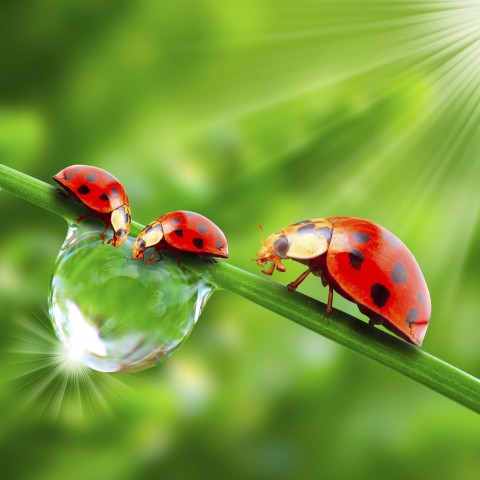
てんとう虫 (tentōmushi) – “ladybug”
6. Birds
Thanks to the wealth of nature in Japan, the country is home to a diverse range of birds. There are 658 species of birds here, 22 of which are foreign.
Despite the rich variety of birds in Japan, the ones we see most often are pigeons, crows, sparrows, and swallows. In Japan, swallows are said to be “summer birds.” This is because seeing them is a sign that summer is coming, as swallows spend winter in the warmer southern areas (such as Taiwan, the Philippines, and Malaysia) before flying back to Japan in spring to raise their chicks.
There are also Japanese superstitions related to birds. For example, it’s believed that sparrows bring good luck and that crows bring bad luck.
| English | Kanji | Hiragana / Katakana | Reading |
| “bird” | 鳥 | とり | tori |
“small (baby) bird” | 小鳥 | ことり | kotori |
| “pigeon” | 鳩 | はと | hato |
| “crow” | 烏 | からす | karasu |
| “sparrow” | 雀 | すずめ | suzume |
| “swallow” | 燕 | つばめ | tsubame |
| “seagull” | ー | かもめ | kamome |
| “eagle” | 鷲 | わし | washi |
| “crane” | 鶴 | つる | tsuru |
| “owl” | 梟 | ふくろう | fukurō |
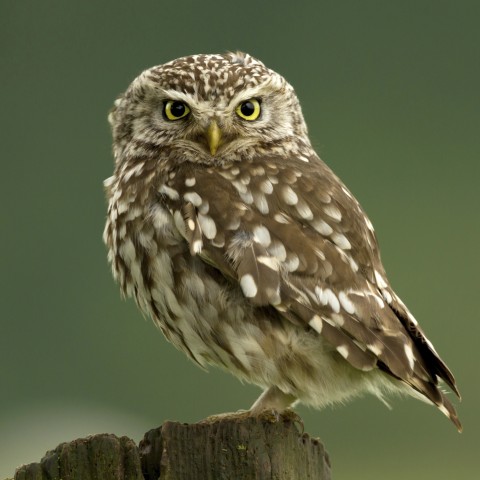
The フクロウ (fukurō), or “owl,” is considered an animal of good omen.
7. Reptiles
In Japanese, reptiles are called 爬虫類 はちゅうるい (hachūrui).
There are 142 reptile species in Japan (19 species of newt, 39 species of frog, 10 species of turtle, 32 species of lizard, and 42 species of snake). Some reptiles, such as turtles and snakes, are popular as pets in Japan.
Reptiles are normally expressed in Katakana, even though most of them have Kanji.
| English | Kanji | Hiragana / Katakana | Reading |
| “turtle” | 亀 | カメ | kame |
| “crocodile” / “alligator” | 鰐 | ワニ | wani |
| “snake” | 蛇 | ヘビ | hebi |
| “frog” | 蛙 | カエル | kaeru |
| “lizard” | 蜥蜴 | トカゲ | tokage |
| “chameleon” | ー | カメレオン | kamereon |
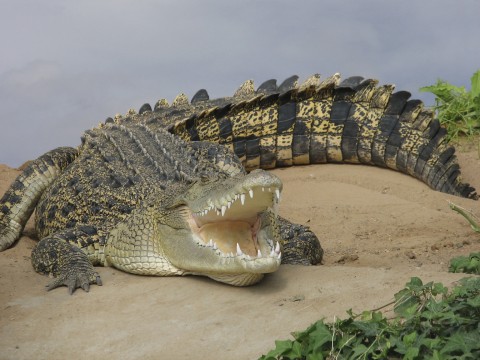
ワニ (wani) – “crocodile” / “alligator”
8. Animal Body Parts
Now that you’ve learned the names of several different animals in Japanese, you should take some time to study the words for animal body parts. Keep in mind that many of the basic body parts listed below are the same for humans and animals. You can learn even more useful words, along with their pronunciation, on our vocabulary list Body Parts in Japanese!
| English | Kanji | Hiragana / Katakana | Reading |
| “horn” | 角 | つの | tsuno |
| “beak” | 口ばし | くちばし | kuchibashi |
| “wing” (birds) | 翼 | つばさ | tsubasa |
| “wing” (insects) / “feather” | 羽 | はね | hane |
| “tusk” | 牙 | きば | kiba |
| “mane” | 立て髪 | たてがみ | tategami |
| “fur” | 毛皮 | けがわ | kegawa |
| “claw” | 鉤爪 | かぎつめ | kagitsume |
| “tail” | 尾 / 尻尾 | お / しっぽ | o / shippo |
| “hoof” | 蹄 | ひづめ | hizume |
| “fin” | 鰭 | ひれ | hire |
| “gill” | 鰓 | えら | era |
| “scale” | 鱗 | うろこ | uroko |
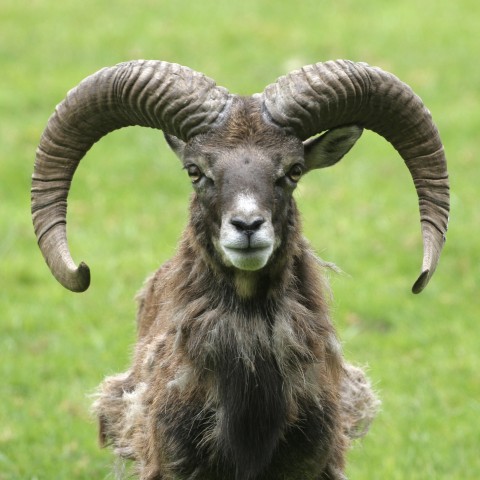
角 つの (tsuno) – “horn”
9. Animal Sounds
The Japanese language has a wide range of onomatopoeia, and animal sounds are one of the most common 擬声語 (gisei-go), or “animate phonomimes” we use.
Here are the sounds animals make in Japanese:
| Animal | Katakana | Reading |
| dog | ワンワン | wanwan |
| cat | ニャーニャー | nyānyā |
| mouse | チューチュー | chūchū |
| pig | ブーブー | būbū |
| sheep | メーメー | mēmē |
| cow | モーモー | mōmō |
| horse | ヒヒーン | hihīn |
| small bird | チュンチュン | chunchun |
| crow | カーカー | kākā |
| chicken | コケコッコー | kokekokkō |
| pigeon | ポッポー | poppō |
| owl | ホーホー | hōhō |
| lion | ガオー | gaō |
| elephant | パオーン | paōn |
| cicada | ミーンミーン | mīnmīn |
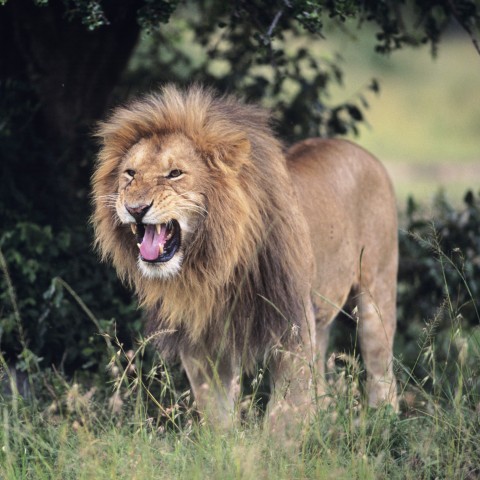
Lions say ガオー (Gaō) in Japanese.
10. Animal-Related Proverbs
There are many Japanese proverbs and sayings that mention animals. Here are some of the most common ones:
- 猿も木から落ちる。
Saru mo ki kara ochiru.
“Even monkeys fall off trees.”
Meaning: Even Homer sometimes nods. / Even someone who is the best at what they do can make mistakes.
Example:
気にすることないよ。猿も木から落ちると言うし、誰でも失敗することがあるよ。
Ki ni suru koto nai yo. Saru mo ki kara ochiru to iu shi, dare de mo shippai suru koto ga aru yo.
“Don’t worry. It says ‘Even monkeys fall off trees,’ and anyone can make mistakes.”
- 飼い犬に手を噛まれる
Kaiinu ni te o kamareru
“To have one’s hand bitten by one’s own dog”
Meaning: To be betrayed by one’s trusted follower
Example:
ずっと面倒をみていた部下に裏切られて、飼い犬に手を噛まれた気分だ!
Zutto mendō o mite ita buka ni uragirarete, kaiinu ni te o kamareta kibun da!
“I feel like I got my hand bitten by my dog, as my subordinate, whom I have been taking care of, betrayed me!”
- 猫の手も借りたい
Neko no te mo karitai
“Wanting even the help of a cat”
Meaning: Being extremely busy, so that you need every little bit of help you can get
Example:
昨日は猫の手も借りたいほど、とても忙しかったです。
Kinō wa neko no te mo karitai hodo, totemo isogashikatta desu.
“Yesterday was so busy that I even wanted to get help from a cat.”
- 捕らぬ狸の皮算用
Toranu tanuki no kawazanyō
“Counting fur of raccoon dogs which you haven’t caught yet”
Meaning: Don’t count your chickens before they hatch. / Do not count on something that has not yet happened. / Do not expect all your hopes to come true.
Example:
昇給とボーナスを期待して家を買うのは、捕らぬ狸の皮算用だよ。
Shōkyū to bōnasu o kitai shite ie o kau no wa, toranu tanuki no kawazanyō da yo.
“Buying a house because you expect a pay-raise and a bonus is like counting the fur of raccoon dogs which you haven’t caught yet.”
To learn more Japanese proverbs, please visit our blog post Japanese Proverbs – Gain Japanese Wisdom and Insight.

捕らぬ狸の皮算用
Toranu tanuki no kawazanyō
“counting fur of raccoon dogs which you haven’t caught yet” = “Don’t count your chickens before they hatch.”
11. Conclusion
In this article, we introduced Japanese animal words for a number of categories:
- Pets
- Farm animals
- Wild animals
- Sea animals
- Birds
- Insects
- Reptiles
In addition, we covered the most important animal body parts, Japanese animal sounds, and proverbs related to animals. If you happen to know of any other animal words, sounds, or idioms we didn’t include, please share them in the comments!
Do you want to continue learning about the Japanese language and culture? Then create your free lifetime account on JapanesePod101.com today! We provide a variety of free lessons designed to help improve your Japanese language skills. Also, with our Premium PLUS service, MyTeacher, you’ll have personal 1-on-1 coaching with your own private teacher.
If you want to increase your Japanese vocabulary even further, you’ll find the following articles quite useful:
- Guide to the Top 100+ Japanese Nouns
- Learn the Top 100 Essential Japanese Adjectives
- The 100+ Most Common Japanese Verbs
And there’s so much more! Learn Japanese faster (and enjoy every second of it) at JapanesePod101.com!
Before you go, let us know in the comments if there are any topics or situations you’d like to learn Japanese words for! We’d be glad to help, and we look forward to hearing from you.










